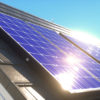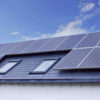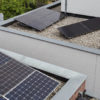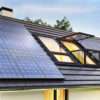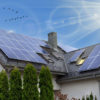In the grand scheme of all things solar, the humble old roof is usually taken for granted. Most people like to think that their roof is solar-fit and can handle any installation. After all, aren’t solar panels designed to go on them? Or, they may feel that handling the roof is the installer’s job and they’ll find a way to make it work.
Both such lines of thinking can present problems down the road. Buyers may end up expecting installations that their roof simply isn’t capable of supporting. The kind of roof you have can dictate how your solar power system will be designed and installed, both of which are a significant part of the cost factor.
This is why it’s important to understand what kind of a roof you have, whether it is suitable for solar installation and what are your options if it is not.
How Do Solar Panels Affect a Roof
It’s best to work our way backwards here and ask what kind of an impact the panels themselves will have on your roof. Firstly, the panels will add weight to the roof. A typical solar panel weighs around 1-2 kg per square foot with the underlying mounting structure.
While regular 3-5 kW systems will fall within the acceptable limits for most roofing materials, it’s best to consult with your installer and roofing contractor whether your roof can handle the load. For reference, here are the typical acceptable load weights by roof material type —
| Roofing Material | Weight per 100 Square Foot |
|---|---|
Asphalt Shingles |
85-110 |
Metal |
35-65 |
Plastic Polymer |
30-135 |
Clay Tile |
270-815 |
Wood |
90-165 |
Solar panels also affect the temperature of your roof. In a good way. Since they’re soaking up solar radiation, they can help you keep your roofs (and hence, your home) cool. A study had found that solar panels on average reduced roof temperature by five degrees. A cooler roof can keep your electricity bills down during the hotter summer months since you won’t have to crank up the air conditioner all the way.
Since the panels are designed to take the most of what weather likes to throw at us, they also act as a shield of armour for your roof. The service life of roofs with solar panels increases as they don’t have to put up with as much abuse.
Finally, solar panels may or may not affect your roof’s warranty depending on how they are mounted and what your roof warranty covers. Generally, a roofer may consider the warranty void if the mounting system penetrates the roof. But, not all solar panel mounts require drilling. Those that use roof clamps won’t have any noticeable effect. Even so, it’s best to talk with your roof before proceeding here.
How Roofing Material Affects Solar Installation
As we covered above, different roof materials have different load bearing capacity. But, they also affect how an installer will go about putting solar panels on them.
Asphalt Shingles: Asphalt is the most popular roofing material and fortunately, works well with solar panels. A lot will depend on how thick the shingles are. Generally, thicker shingles have longer warranties. If the installer has to drill the roof for installation then they will need to “flash” it as well. Flashing involves adding additional material in order to stop water from seeping inside the roof.
Metal Roofs: Metal roofs can be easy or challenging for installers depending on their construction. Standing seam roofs are easy as the installer can simply clamp the mounting system to it. Corrugated metal roofs on the other hand are harder to work with since they’re usually not strong enough to support the weight of the panels. and the panel mounts have to be attached to the support structure underneath.
Clay Tile Roofs: While they look great, clay tiles are not ideal for solar panels because they are so brittle. Consequently, installing a solar power system on a tile roof can cost more as there’s usually some damage to the tiles and installers have to spend more man-hours on them.
Some installers can use a method called “comp-out” where they replace the tiles underneath the panels with composite shingles. Others may opt to drill a hole in the tile and attach the panels to the wooden sheath underneath the tiles.
Wood Roofs: Wood is again, not ideal for a solar installation but can be worked on with a little effort. Like clay tile roofs, installers usually install the panels on the roof’s underlying structure rather than the roof itself.
Find an Installer Right For Your Roof
Installers will often have experience in installing panels on specific kinds of roofs. While many may tell you they can design and install any system on any roof to score the sale, chances are they actually haven’t worked on a house with a roof such as yours.
With bidmysolar’s help, you can find the best installer for your home in a few clicks. Our process ensures the buyer’s interests are held highest and only the best, CEC approved solar installers bid on your project.
Interested in finding out more? Feel free to contact us with any questions you may have.

